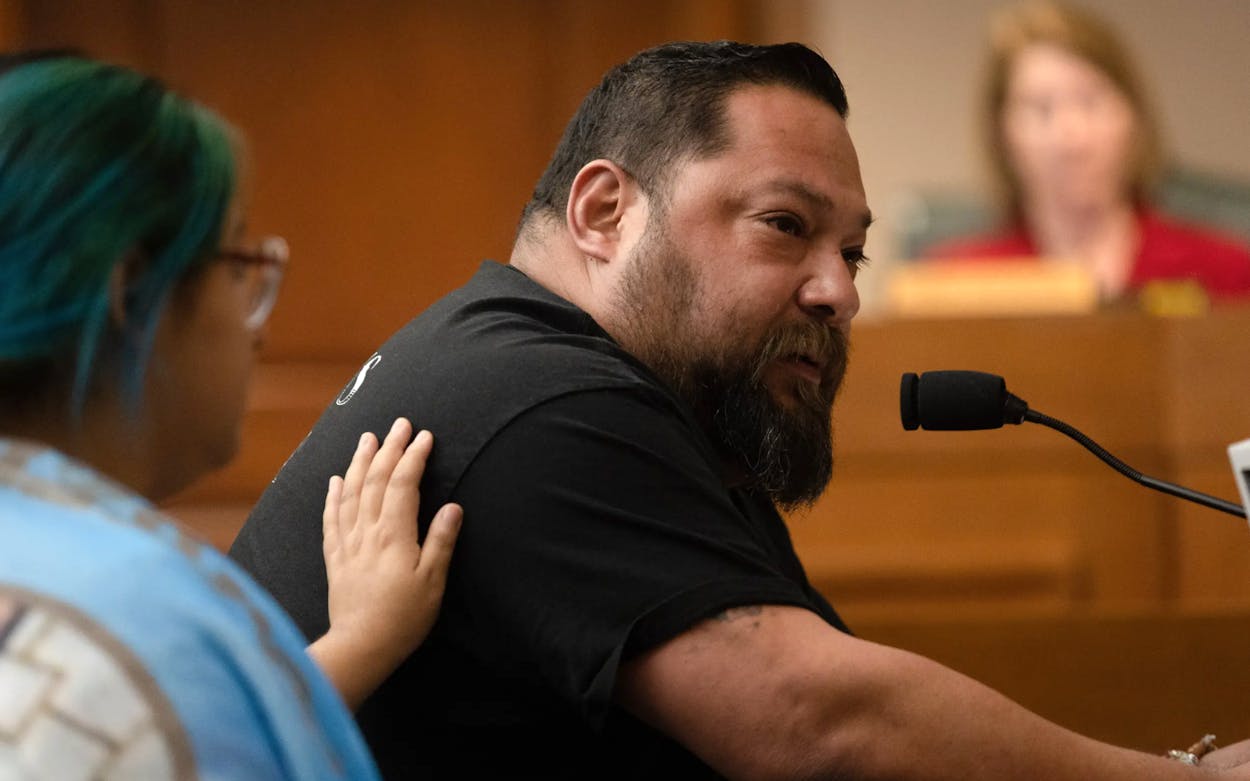With emotional testimony about their own experiences, parents of children who were killed in the Uvalde school shooting urged a Texas House committee late Tuesday to pass onto the full chamber a bill that would raise the minimum age to purchase certain semiautomatic rifles.
Families waited more than twelve hours after the House Select Committee on Community Safety first convened at about 9 a.m. to testify about their final memories with some of the nineteen children and two teachers who were killed in the May 24 mass shooting at Robb Elementary and how their lives have changed since.
At one point crying, Javier Cazares testified that his daughter Jacklyn Cazares, age nine, never learned to ride a bike, never made it to the fifth grade, and could never become a vet.
“All that we are asking is for reasonable, commonsense laws,” he said.
Velma Lisa Duran’s sister, teacher Irma Garcia, was killed attempting to shield her students from the gunman.
“It is the least you can do to acknowledge the number one cause of death for the most vulnerable: our children,” Duran said.
This is the first Texas legislative session since the state’s worst school shooting in history. For more than thirteen years, lawmakers have loosened gun regulations and made accessing firearms easier, despite eight mass shootings in the same period.
Any bill creating new regulations on gun access is sure to face an uphill battle in the Republican-controlled Texas Legislature.
The testimony was during a hearing for House Bill 2744, from Democratic state Rep. Tracy King, who represents Uvalde. The bill would prohibit selling, renting, leasing, or giving a semiautomatic rifle with a caliber greater than .22, that is capable of accepting a detachable magazine, to a person younger than 21 years old.
The Uvalde gunman used an AR-15-style rifle, which he purchased within days of turning eighteen—after unsuccessfully trying to persuade relatives to illegally buy him a gun.
The bill includes exceptions if the recipient of the firearm is a peace officer or a current or honorably discharged member of the U.S. Armed Forces.
King said a revised bill would add exceptions to certain temporary loans of such a firearm, for instance for shooting on the property of the owner.
Had the bill been law, King as well as some of those who testified said, the Uvalde shooter would not have been able to legally purchase the weapon he used.
“Our hearts may be broken,” Kimberly Mata-Rubio, whose ten-year-old daughter Lexi was killed in the shooting, told lawmakers. “But our resolve has never been stronger.”
Opponents of the measure, including a National Rifle Association representative, say it would be found unconstitutional and would unfairly target responsible owners of such guns who are between 18 and 21 years old. Others said instead of limiting who can own guns, that more armed residents—including teachers—are essential to stopping shootings in schools.
But there were far more people that showed up in support of the bill.
El Paso Rep. Joe Moody, a Democrat, pushed back on the constitutional argument, saying the Legislature has a responsibility to figure out constitutional boundaries.
Several family members of victims noted that the police officers who responded to Robb Elementary later said they were afraid of confronting the gunman’s AR-15-style rifle, the key finding of a Texas Tribune investigation published in March.
The committee was still hearing testimony shortly before midnight. Dozens of witnesses testified. Each speaker was given two minutes. Roughly fifty people who had registered to speak still hadn’t been called to speak just after midnight.
Zach Despart contributed to this story.
This article originally appeared in the Texas Tribune.
- More About:
- Politics & Policy
- Texas Lege






